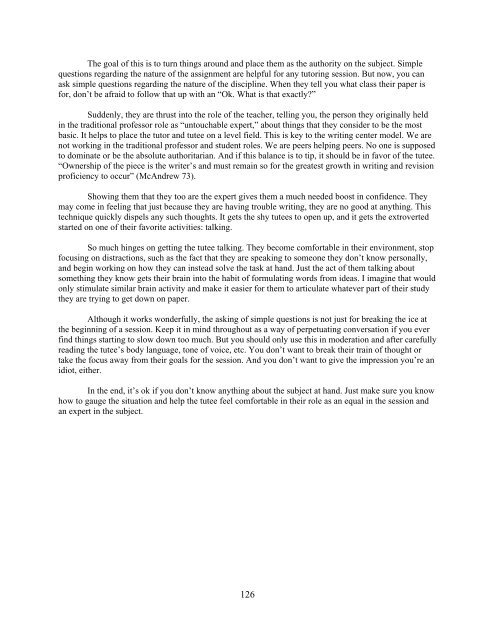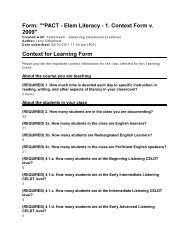The Tutoring Book - California State University, Sacramento
The Tutoring Book - California State University, Sacramento
The Tutoring Book - California State University, Sacramento
You also want an ePaper? Increase the reach of your titles
YUMPU automatically turns print PDFs into web optimized ePapers that Google loves.
<strong>The</strong> goal of this is to turn things around and place them as the authority on the subject. Simple<br />
questions regarding the nature of the assignment are helpful for any tutoring session. But now, you can<br />
ask simple questions regarding the nature of the discipline. When they tell you what class their paper is<br />
for, don’t be afraid to follow that up with an “Ok. What is that exactly?”<br />
Suddenly, they are thrust into the role of the teacher, telling you, the person they originally held<br />
in the traditional professor role as “untouchable expert,” about things that they consider to be the most<br />
basic. It helps to place the tutor and tutee on a level field. This is key to the writing center model. We are<br />
not working in the traditional professor and student roles. We are peers helping peers. No one is supposed<br />
to dominate or be the absolute authoritarian. And if this balance is to tip, it should be in favor of the tutee.<br />
“Ownership of the piece is the writer’s and must remain so for the greatest growth in writing and revision<br />
proficiency to occur” (McAndrew 73).<br />
Showing them that they too are the expert gives them a much needed boost in confidence. <strong>The</strong>y<br />
may come in feeling that just because they are having trouble writing, they are no good at anything. This<br />
technique quickly dispels any such thoughts. It gets the shy tutees to open up, and it gets the extroverted<br />
started on one of their favorite activities: talking.<br />
So much hinges on getting the tutee talking. <strong>The</strong>y become comfortable in their environment, stop<br />
focusing on distractions, such as the fact that they are speaking to someone they don’t know personally,<br />
and begin working on how they can instead solve the task at hand. Just the act of them talking about<br />
something they know gets their brain into the habit of formulating words from ideas. I imagine that would<br />
only stimulate similar brain activity and make it easier for them to articulate whatever part of their study<br />
they are trying to get down on paper.<br />
Although it works wonderfully, the asking of simple questions is not just for breaking the ice at<br />
the beginning of a session. Keep it in mind throughout as a way of perpetuating conversation if you ever<br />
find things starting to slow down too much. But you should only use this in moderation and after carefully<br />
reading the tutee’s body language, tone of voice, etc. You don’t want to break their train of thought or<br />
take the focus away from their goals for the session. And you don’t want to give the impression you’re an<br />
idiot, either.<br />
In the end, it’s ok if you don’t know anything about the subject at hand. Just make sure you know<br />
how to gauge the situation and help the tutee feel comfortable in their role as an equal in the session and<br />
an expert in the subject.<br />
126

















